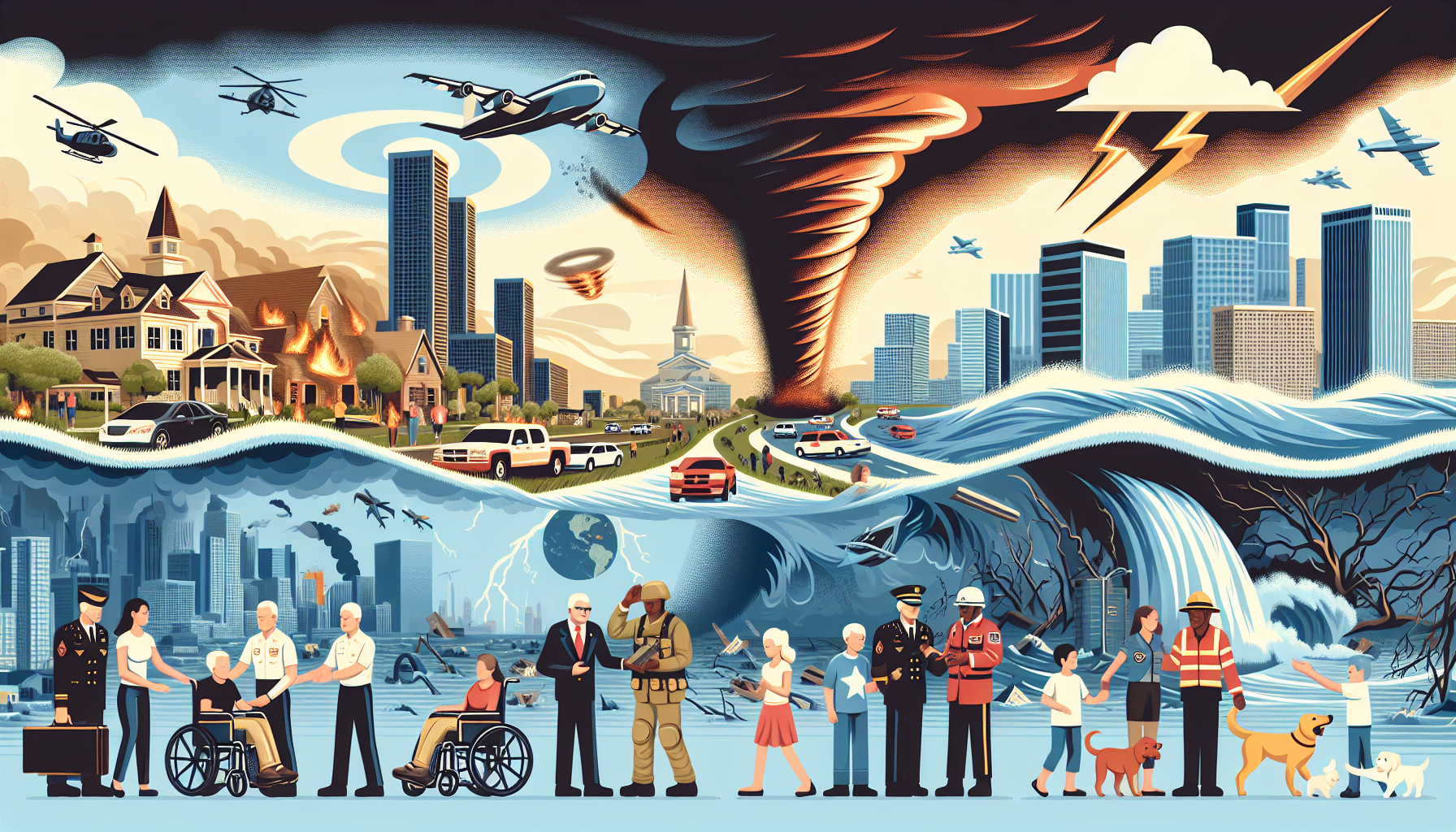Definition
A complex catastrophe in military operations refers to a natural or man-made incident, including terrorism, that results in extraordinary levels of mass casualties, damage or disruption, significantly affecting the population, environment, and infrastructure. This situation severely and immediately challenges the government’s ability to respond and recover, possibly resulting in a long-term negative impact on society. It involves multiple, simultaneous events, or incidents that occur in quick succession, and requires a broad, multi-agency or international approach to address.
Key Takeaways
- A complex catastrophe refers to a disaster situation which involves a multifaceted response and recovery process due to the complexity and vastness of its impact. This could be because of multiple event occurrences, widespread devastation, or consequential cascading effects.
- In military operations, managing a complex catastrophe often requires interagency cooperation and coordination, as well as international assistance. This is due to the often extensive scale of the disaster, necessitating the mobilization of various expertise and resources.
- Strategies for effective response to a complex catastrophe include comprehensive preparation and planning, efficient communication and decision-making processes, as well as continuous assessment and improvement procedures.
Importance
The military operations term “complex catastrophe” holds vital importance as it refers to a severe occurrence, typically involving multiple geographically-dispersed incidents that happen simultaneously or in close succession.
These events often include natural disasters, disease outbreaks, or large-scale terrorist attacks, and necessitate a comprehensive, coordinated, and rapid response to mitigate dire consequences.
Recognizing a situation as a complex catastrophe enables the military — often functioning as a key component of a broader, inter-agency response — to effectively mobilize resources, streamline decision-making, and implement strategic relief and recovery operations, thus preserving national security, minimizing loss of life, and maintaining societal stability.
Explanation
The term “complex catastrophe” in the realm of military operations refers to an event or series of events, either natural or man-made, that results in severe damage or potentially devastating consequences. These catastrophic situations often involve wide-ranging knock-on effects that challenge conventional response and recovery methods, requiring a highly coordinated strategy involving various humanitarian and security factions.
They typically affect large geographic areas, and could include incidents like a destructive earthquake, pandemic disease outbreaks, or widespread nuclear or chemical contamination. The key purpose of recognizing and planning for a “complex catastrophe” is to anticipate unforeseen challenges and to manage resources, manpower, and overall responses to these.
This proactive planning can save innumerable lives and reduce the damage massively. Comprehending the intricacies and ramifications of such major calamities, military strategists can strategize specific techniques, mechanisms, or collaborations to handle the situation effectively and efficiently.
Thus, understanding the concept of a complex catastrophe is essential for producing a holistic and effective disaster response strategy.
Examples of Complex catastrophe
2010 Haiti Earthquake: This
0 magnitude earthquake devastated Haiti, causing extensive damage to infrastructure, vast loss of life (approximately 230,000 to 300,000 people were killed), and left
5 million people displaced. The humanitarian crisis that ensured was a complex catastrophe because it combined natural disaster with pre-existing societal issues such as poverty, lack of infrastructure and governmental instability. The international community, including various military operations, was necessitated for urgent relief, aid and reconstruction work.
Syrian Civil War: Beginning in 2011, this conflict is a complex catastrophe due to its multi-dimensional nature. It includes internal civil war, religious and ethnic strife, chemical weapons use, refugee crisis and proxy war involving multiple foreign nations. Military operations here face the challenge of navigating the overlapping local, regional, and international parties vested in the outcomes.
The Fukushima Daiichi Nuclear Disaster: Following the Tohoku earthquake and subsequent tsunami in 2011, Japan experienced the worst nuclear disaster since Chernobyl. The event caused substantial displacement of populations due to radioactive contamination fears and resulted in major energy supply disruptions. Decontamination and reconstruction require careful coordination between military operations, nuclear regulators, and various levels of government. Additionally, sheer scale, radiation risk and long-term health consequences for population make this a complex catastrophe.
FAQs for Complex Catastrophe Military Operations
What is a Complex Catastrophe in Military Operations?
A complex catastrophe in military terms refers to a multifaceted disaster scenario which demands a compounded response effort. This could result from an overlap of natural disasters, terrorist activities, and war regions, resulting in massive-scale devastation and loss.
How is a Complex Catastrophe different from a Simple Catastrophe?
A simple catastrophe refers to an incident with a single-point cause, like an earthquake or a terror attack. A complex catastrophe, however, is a mixture of several adverse situations happening simultaneously, making it much worse than a simple catastrophe.
What strategies does the Military use in Complex Catastrophe Scenarios?
The military employs a combination of its various sub-units like airborne, marine, special ops among others, and logistics strategies. The precise strategy depends on the nature of the catastrophe. It could involve mass evacuation, quarantine enforcement, medical assistance, and peacekeeping among other actions.
What are some known instances of military handling of Complex Catastrophes?
Some known instances of military involvement in complex catastrophes include the response to Hurricane Katrina in the USA and the coordination of efforts in the aftermath of the 2004 Indian Ocean Tsunami.
How can one join the Military Division responding to Complex Catastrophes?
Joining the Military Division that responds to Complex Catastrophes involves initial training in the military, followed by specialized training in Disaster Management. All details about the recruiting process and training can be obtained from the official military website or local recruitment office.
Related Military Operation Terms
- Disability Compensation
- Veterans Pension
- Dependency and Indemnity Compensation
- Special Monthly Compensation
- Adapted Housing Grants
Sources for More Information
- Federal Emergency Management Agency (FEMA): FEMA provides information on different types of disasters, including complex catastrophes and their management.
- Department of Homeland Security (DHS): DHS offers resources and guides on disaster and catastrophe prevention, emergency response, etc.
- U.S. Department of Defense (DoD): The DoD may provide insights into complex catastrophes from a military perspective.
- American Red Cross: Provides disaster relief information and emergency management details, including response to complex catastrophes.
 Benefits.com Advisors
Benefits.com Advisors
With expertise spanning local, state, and federal benefit programs, our team is dedicated to guiding individuals towards the perfect program tailored to their unique circumstances.
Rise to the top with Peak Benefits!
Join our Peak Benefits Newsletter for the latest news, resources, and offers on all things government benefits.




















